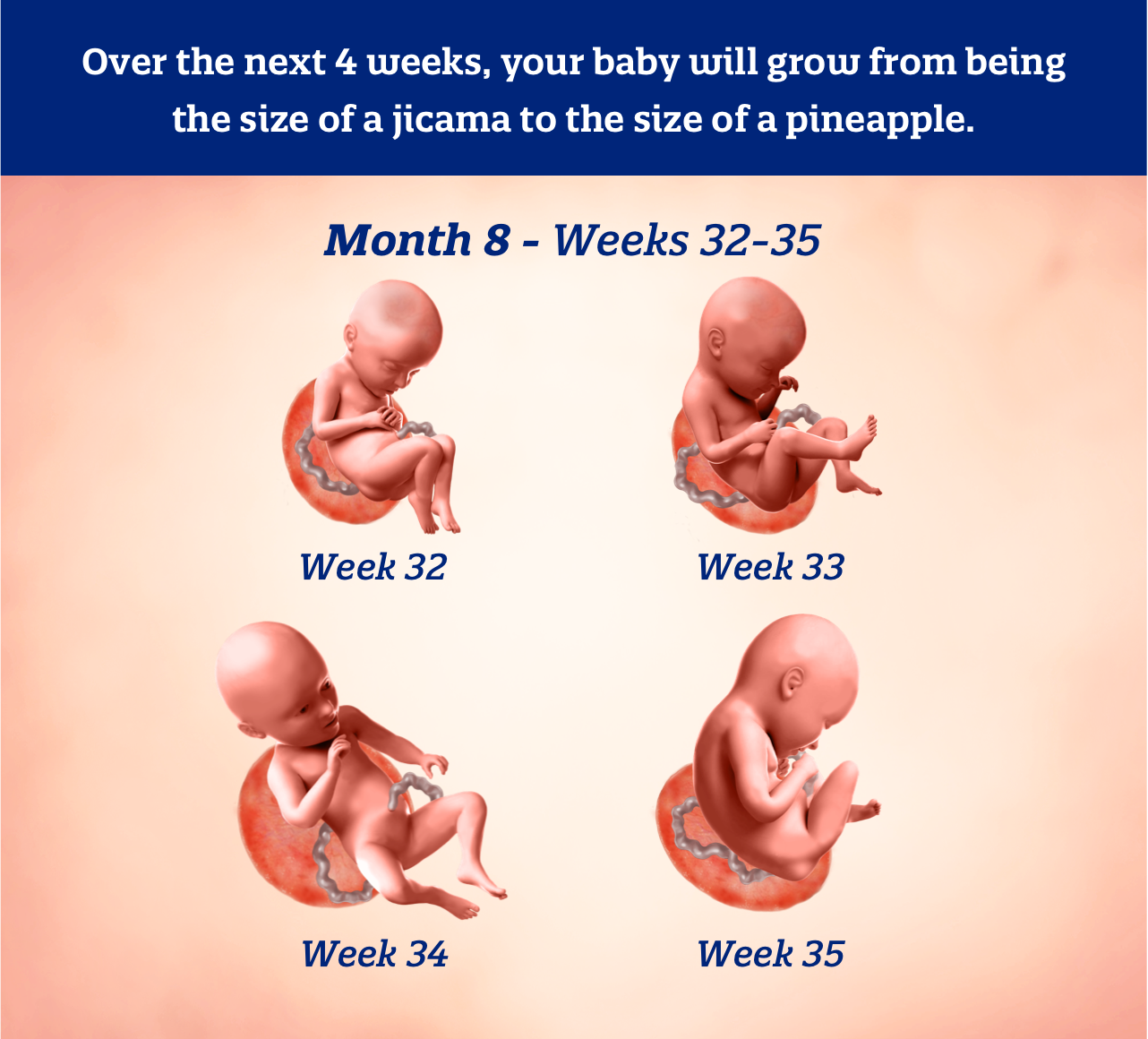
Due to maintenance, rewards points for receipt uploads will be delayed. Thank you for your patience!

Find out what changes may be in store for you and your baby during your eighth month of pregnancy
The countdown is on! You’re 8 months pregnant and will soon be holding your baby in your arms. But your little one is still growing and your body is continuing to change as well. Your larger uterus may be affecting your breathing and veins a bit, and your nesting instinct may be in full swing as you prepare for the arrival of your bundle of joy. Here are a few things that may be on the horizon during the midpoint of your third trimester.
You might feel some shortness of breath as your enlarged uterus puts pressure on your diaphragm. Try sleeping on your side and propping yourself with pillows. Practice good posture, which may help your lungs expand. Deep breathing exercises may also provide some comfort. If you experience severe shortness of breath accompanied by chest pain or rapid pulse, seek immediate medical attention.
During this later pregnancy stage, varicose veins, characterized by blue or red swollen veins, may appear on your legs. Hemorrhoids, or swollen veins in the rectal and anal area, can also develop around this time.
Hormones, pressure on blood vessels from your growing baby, and increased blood volume can all contribute to this common experience that usually improves after you give birth. While typically harmless, varicose veins can be uncomfortable and itchy and, in the case of hemorrhoids, may cause rectal bleeding. Here are some strategies that may help ease some of the discomfort:
For hemorrhoids, drink plenty of water, increase your fiber intake, and ask your doctor about pregnancy-safe over-the-counter creams. If the varicose veins or hemorrhoids become very painful or the at-home remedies aren’t working, contact your healthcare provider.
As your body prepares for lactation, your breasts may leak some drops of colostrum. Also known as “first milk” or “pre-milk,” colostrum is a waxy, yellow substance that comes in before your mammary glands start to produce mature milk. It has antibodies and protein to support your newborn’s immune system. Once your little one arrives, it will be their first food. For now, though, wearing nursing pads or putting some tissue in your bra can help absorb some of the fluid and avoid staining on your clothes.
Braxton Hicks contractions, sometimes called “false labor,” are unpredictable tightening sensations in the abdomen that may last from 15 seconds to two minutes. Dehydration, a full bladder, sex, and high activity levels are some potential triggers of this common third-trimester experience believed to be the body’s way of toning your uterine muscles in preparation for labor. Drinking water, changing position, and resting may help them stop.
While possibly uncomfortable, Braxton Hicks contractions are not actual labor; in the case of true labor, the contractions would increase in frequency and get progressively stronger. Call your doctor immediately if you believe you may be in actual labor.
Feeling the urge to organize your garage and clean the baseboards behind your fridge? You’re not alone. Expectant mamas often talk about getting into “nesting” mode toward the end of their pregnancy. This maternal phenomenon may include everything from setting up the nursery to polishing silverware you’ve never used.
If you’re feeling extra productive and have a bunch of pre-baby projects on your to-do list, just be sure you’re being safe. Ask someone else to go up the ladder or move the heavy furniture. If you’re overly anxious or feeling overwhelmed, talk to your doctor.
Not a nester? That’s totally fine. Not every mom-to-be is. Listen to your body and do what’s right for you.
During your eighth month, some of the issues you’ve been dealing with up until this point may continue, such as round ligament pain, leg cramps, skin issues, breast changes, and an increased need to pee.
At this point in your pregnancy, your uterus is about five inches above your belly button. Your larger belly—along with foot swelling and looser joints—may cause you to waddle a bit and start to feel a little clumsy.

At 8 months pregnant, the fetus is developing body fat reserves, which will help your baby store energy, provide warmth, and of course, contribute to those irresistibly cute cheeks and leg rolls you’ll soon be pinching. The brain is growing, and the lungs and immune system are still developing, but most other internal organs and systems are just about ready for go time. The digestive system will continue to develop after birth. And while your baby may be getting a bit tight in the womb, they will still be kicking strong.
By the end of your eighth month, your little love is about the size of a squash.
All information on Enfamil, including but not limited to information about health, medical conditions, and nutrition, is intended for your general knowledge and is not a substitute for a healthcare professional's medical identification, advice, or management for specific medical conditions. You should seek medical care and consult your doctor or pediatrician for any specific health or nutrition issues. Never disregard professional medical advice or delay seeking medical treatment, care, or help because of information you have read on Enfamil.